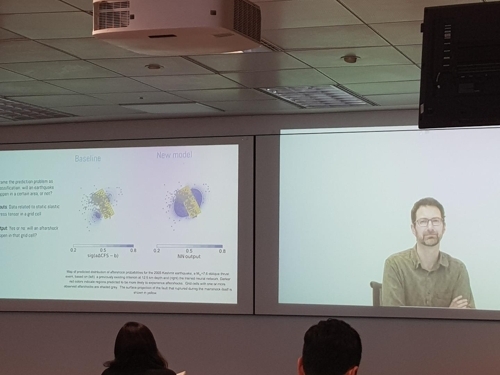Google Inc. could greatly improve the prediction of earthquake aftershocks by using machine learning, a type of artificial intelligence (AI) technology, a scientist from the company said Tuesday.
In earthquakes, an initial mainshock is typically followed by a series of smaller aftershocks. Forecasting the locations of these aftershocks has become important as they can significantly hamper recovery efforts.
Martin Wattenberg, a senior staff research scientist at Google's People + AI Research initiative, has joined hands with a team of researchers from Harvard University to see if they can apply machine learning to explain where aftershocks might occur.
 |
(Yonhap) |
"We applied machine learning algorithms to analyze a database of earthquakes from around the world to try to predict where aftershocks might occur," the scientist told reporters in Seoul by a video conference, adding that the system improved the precision rate to six percent from the previous three percent.
The researchers' neural network system trained on more than 131,000 earthquakes and could predict the locations of aftershocks in an independent test data set of more than 30,000 earthquakes, more accurately than the classic Coulomb method.
Wattenberg said this machine-learning-driven system provides improved forecasts of aftershock locations and identifies physical quantities that may control earthquake triggering during the most active part of the seismic cycle.
"It's still a low precision ... it's not accurate enough for practical use but it's an exciting first step," Wattenberg said.
"This is a real improvement, but to be clear, not yet strong enough for practical use."
The scientist said the machine learning-based forecasts may one day help emergency and rescue services, and even inform evacuation plans.
PAIR is a team of AI researchers with the focus on the "human side" of AI, including the relationship between users and technology, Google said. The goal is not just to publish research papers but also releasing open source tools for researchers and other experts to use. (Yonhap)





![[Exclusive] Hyundai Mobis eyes closer ties with BYD](http://res.heraldm.com/phpwas/restmb_idxmake.php?idx=644&simg=/content/image/2024/11/25/20241125050044_0.jpg)

![[Herald Review] 'Gangnam B-Side' combines social realism with masterful suspense, performance](http://res.heraldm.com/phpwas/restmb_idxmake.php?idx=644&simg=/content/image/2024/11/25/20241125050072_0.jpg)
